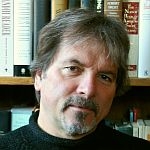 (HOST) Commentator Bruce Farr had a summer cold on the Fourth of July, but it didn’t stop him from pondering the troublesome state of our nation.
(HOST) Commentator Bruce Farr had a summer cold on the Fourth of July, but it didn’t stop him from pondering the troublesome state of our nation.
(FARR) Suffering from a summer cold is tough on both the body and the spirit. The former for obvious reasons and the latter because the season’s balmy weather unequivocally invites us outdoors, where all the action is. It’s the opposite of having a cold in winter, when staying inside to nurse a runny nose doesn’t seem like such a bad idea.
But so it was that on Sunday, at dusk, I found myself forced to sit out the usual Fourth of July hoopla, having instead to plop myself down in an Adirondack chair in my front yard with a tall glass of ice water and a box of tissues.
Without much else to do, I observed that the sun sank behind the silhouetted lift of hills in front of me at precisely 8 p.m. It wasn’t very long afterwards that an opening volley of fireworks thundered in the sky.
From my perch, I noted first a crackle and then a sonorous boom from the south that, to my surprise, seemed to be echoed exactly in the north. I soon realized, though, that I was hearing two separate fireworks shows-one in town and the other miles away, down on the lake. I couldn’t actually see any of the grand explosions-just a glimmer of light over the darkening hills-so I had to rely on my auditory skills to get into the spirit of things.
As the two fireworks shows rumbled in the distance-one melodramatic report answered by another-I imagined that they actually were trying to outdo each other in noise and celebration; a jolly competition, the louder and more raucous the better for everyone’s sake.
And though a thousand pundits have expounded on it recently, this Independence Day evening seemed like the perfect background to wonder at the state of our nation, and where it’s headed in these worrisome times.
That same morning, The Sunday New York Times had run an article on a new Norman Rockwell exhibit at the Smithsonian. The piece lamented the vanishing sense of compassion and civility as expressed in the small-town vignettes Rockwell was a master at illustrating in the years following World War II. Who could forget such indelible scenes as a family laden with packages swinging open grand-dad’s door at Christmastime, or the image of a lone man standing to speak his convictions at a town meeting? Whether or not Rockwell manipulated or idealized these images of home-spun America might be a topic for debate, but that they became lasting symbols of the quintessential American spirit has never been questioned.
In contrast with these pictures of American unity, we seem today to be mired in a war with ourselves, weighed down in desperate disagreement about our own and the whole world’s problems. Is it futile to wonder what became of the small-town values that once shaped our nation and bound us together?
Some might call it naïve, but as the rockets’ red glare faded over the green mountains, it occurred to me that we might seek a path toward a saner and more sensible national conduct by thinking back to our nation’s beginnings.